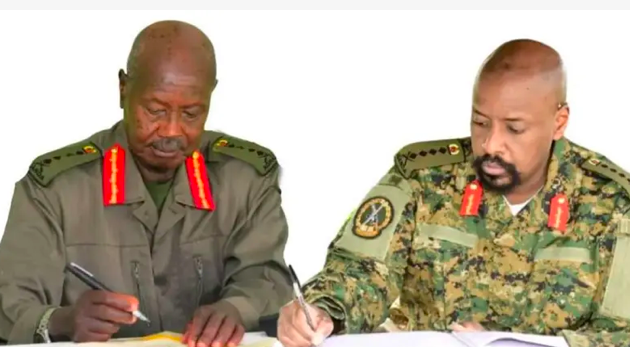President Yoweri Museveni has appointed his son, General Muhoozi Kainerugaba as the Chief of Defence Forces, a position that places him at the pinnacle of the military command in Uganda. This appointment was announced late last night, signaling a notable change in the country’s military leadership. The state-run media outlet, UBC, released a statement detailing that the previous Chief of Defence Forces, General Wilson Mbadi, has been reassigned to the role of the State Minister for Trade in the Ministry of Trade and Cooperatives.
General Muhoozi Kainerugaba’s elevation to this critical role comes after a period of increased visibility in activities that have been perceived as political campaigning across various regions of Uganda since last year. This move by President Museveni, who has been in power for 38 years, marks a pivotal moment in Uganda’s political and military landscape.
Muhoozi, who is set to turn 50 next month, has been a prominent figure in the military, having previously served in various capacities, including as the commander of the Special Forces Command. His last military assignment was in October 2022 when he was removed from his position as the commander of the land forces, a move that at the time, stirred significant public discourse.
Over the past year, Muhoozi has notably engaged with the Ugandan populace in what appeared to be political rallies, signaling his interest in the political arena. He has even hinted at running for the presidency in the 2026 elections through social media posts, which were later deleted. Despite these activities and his apparent interest in a political career, his recent appointment as the Chief of Defence Forces could signify a strategic withdrawal from direct political engagements, although the ultimate aim of this new appointment remains unclear.
While it is evident that General Muhoozi’s new role marks a shift in his career trajectory, it raises questions about the future political landscape of Uganda, especially considering his previous expressions of interest in the presidency. It remains uncertain whether President Museveni supports his son’s political ambitions or if he will seek re-election in 2026, having secured a sixth term in 2021.
The recent developments in Uganda’s military and political spheres are closely watched by regional observers, especially given the historical context of leadership transitions in the region. The implications of these changes for Uganda’s future, both domestically and in its relations with neighboring countries, particularly Rwanda, with which Uganda has had a complex relationship, are yet to be fully understood. This appointment could have significant ramifications for the region, given the strategic importance of Uganda and its military in East African politics and security dynamics.
As Uganda navigates this new phase in its military leadership, the regional and international community will be keenly observing the impact of General Muhoozi’s appointment on the country’s political stability and its relations within the East African region.





























































